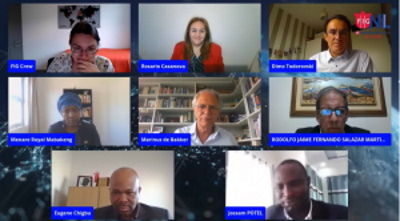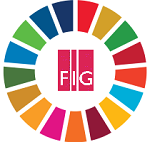News in 2022

|
FIG and the Sustainable Development Goals - Commission
January, 2022
FIG Task Force on FIG and the Sustainable Development Goals together
with the ten Commissions have worked on their role on the sustainable
development goals relevant for their Commission.
Commission Chair David Mitchell gives his Statement on the
sustainable development goals in relation to Commission 2 -
Professional Education
|

|

Commission 2 focuses on innovative and effective professional
education and training for surveyors. That makes SDG Goal 4 "ensure
inclusive and equitable quality education and promote lifelong learning
opportunities for all" the most relevant to the work of Commission 2. As
we focus on higher education the following targets are particularly
relevant:
- Target 4.3: By 2030, ensure equal access for all women and men
to affordable and quality technical, vocational and tertiary
education, including university
- Target 4.5: By 2030, eliminate gender disparities in education
and ensure equal access to all levels of education and vocational
training for the vulnerable including persons with disabilities,
indigenous peoples and children in vulnerable situations
- Target 4.7: By 2030, ensure that all learners acquire the
knowledge and skills needed to promote sustainable development,
including, among others, through education for sustainable
development and sustainable lifestyles, human rights, gender
equality, promotion of a culture of peace and non-violence, global
citizenship and appreciation of cultural diversity and of culture’s
contribution to sustainable development
How do you include the SDG's in your daily work?
The indicators under Targets 4.3, 4.4 and 4.5 provide some guidance
on how Commission 2 can support meeting the overall Goal 4. Our work
focusses on making higher education more accessible for all potential
surveying students therefore supporting participation and this is a key
focus of Working Group 1 on regional academic networks. Working Group 2
also seeks to support education for sustainable development in
conjunction with the other commissions.
- Indicator 4.3.1: Participation rate of youth and adults in
formal and non-formal education and training in the previous 12
months, by sex
- Indicator 4.5.1: Parity indices (female/male, rural/urban,
bottom/top wealth quintile and others such as disability status,
indigenous peoples and conflict-affected, as data become available)
for all education indicators on this list that can be disaggregated
- Indicator 4.7.1: Extent to which (i) global citizenship
education and (ii) education for sustainable development are
mainstreamed in (a) national education policies; (b) curricula; (c)
teacher education; and (d) student assessment
What are inspiring examples of how FIG members and delegates have
contributed to the achievement of the SDGs (e.g. refer to a paper,
project or publication)?
A key Commission 2 session focusing on the SDGs at the FIG e-Working
Week 2021 was the session run by Commission 2 working group 1 - "02.1
- Regional Academic Networks: Lessons from COVID-19 for SDG Goal 4
(education)". This session had the highest attendance for any
session at the event. Proceedings can be accessed via this
link

Speakers session run by Commission 2 during FIG
e-Working Week
What can FIG do (more) to privide leadership and raise awareness on
the SDG's?
Delegates of Commission 2 are finalising a report on Blended Learning
for Surveying Education and this will be published next year. Blended
learning is a key strategy in making education more widely available and
accessible to all - especially in countries where acccess to major
cities to study is difficult for many people. Surveying academic
institutions are supporting the development of blended learning and
tremendous progress has been made in the last 2 years. FIG will continue
to support the Surveying education community to mainstream global
citizenship education and education for sustainable development into
education policies.
David Mitchell
and Paula Dijkstra
January 2022



























